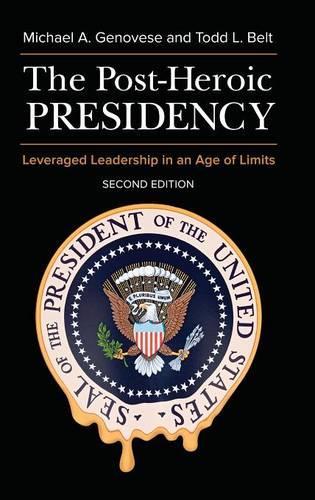
The Post-Heroic Presidency: Leveraged Leadership in an Age of Limits
(Hardback, 2nd edition)
Publishing Details
The Post-Heroic Presidency: Leveraged Leadership in an Age of Limits
By (Author) Michael A. Genovese
By (author) Todd L. Belt
Bloomsbury Publishing PLC
Praeger Publishers Inc
13th June 2016
2nd edition
United States
Classifications
Tertiary Education
Non Fiction
320.473
Physical Properties
Hardback
320
Width 156mm, Height 235mm
680g
Description
This book examines how presidents from Nixon to Obama have faced the challenges of global leadership in a dramatically changing worldone with more limited resources and an increasing number of threatening challengers. The immediate post-World War II era was undeniably a period of American power and influence. Even during the Cold War, the United States was the leader of the West, exerting wide-ranging power internationally. But beginning with the Vietnam War, America began experiencing a series of setbacks and challenges to its power. The Post-Heroic Presidency: Leveraged Leadership in an Age of Limits examines how U.S. presidents have attempted to reverse or contend with this new era of limited power in which presidential leadership is hamstrung due to an increasingly globalized and interdependent worldone where power is more diffuse and the system of checks and balances bind a president in an age of hyper-partisanship. The book examines presidents of the 20th and 21st centuries, explaining how the first U.S. president to confront this new age was Richard Nixon, whoalong with Henry Kissingerdeveloped a sophisticated approach to deal with the recalibration of American power. It documents how other recent presidents have either tried to make peace with limited power (Jimmy Carter), reverse the decline (Ronald Reagan), ignore the implications of limits (George W. Bush), or find ways to lead that were less ambitious, more prudent, and less unilateral (George H.W. Bush, Bill Clinton, and Barack Obama). In the cases of Clinton and Obama, this shift to using "soft power," persuasion, and multilateralism earned them criticism that they are "weak," thereby undermining their efforts to leadboth at home and abroad.
Author Bio
Michael A. Genovese, PhD, holds the Loyola Chair of Leadership Studies, is professor of political science, and is director of the Institute for Leadership Studies and president of the World Policy Institute at Loyola Marymount University. Todd L. Belt, PhD, is professor of political science at the University of Hawai'i at Hilo.
